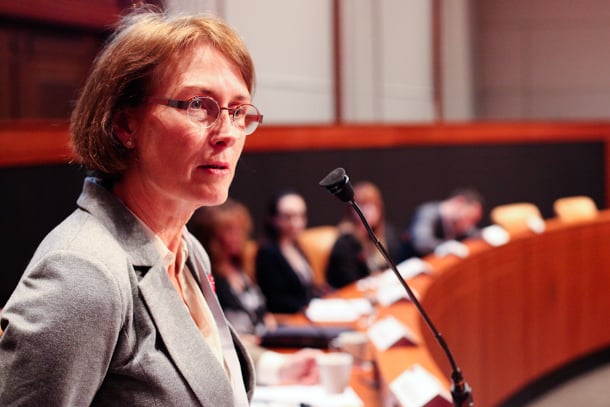The province is failing to support youth after they age out of the foster care system, according to B.C.'s Representative for Children and Youth.
In a report released yesterday, independent watchdog Mary Ellen Turpel-Lafond called for "targeted services and supports" for youth past the current age limit of 19 -- including establishing a "youth secretariat" to liaise with government departments, legislating a Youth Leaving Care Act, and in some cases allowing youth to stay in foster care until age 25 if they are in post-secondary school or a trade apprenticeship program.
According to the report, this recommendation would ensure vulnerable youth "are not transitioning to dependence," or a situation with fewer opportunities for work, education and financial stability.
On the youth in care file, "the province's grade is not a good one," Turpel-Lafond said in an interview. Government makes support commitments on a piecemeal basis, she said. "They're not bad things, but are they scalable for the whole province?"
Existing B.C.-funded programs include Strive, an 18-month test project run by YWCA Metro Vancouver, which helps older youth transition out of foster care by offering mentorship, job skills, and small debt relief. Turpel-Lafond applauded such efforts, but argued that most of the province's projects benefit Metro Vancouver, with less support outside urban centres.
"Not all the kids in care live in the City of Vancouver. What about everywhere else?" Turpel-Lafond asked, adding Vancouver may be becoming a "magnet" for kids in care. "Is that why we've had a rise in homelessness? I don't know, but it could be."
700 kids on their own annually
The minister of children and family development agreed more needs to be done for the roughly 700 youth who age out of the foster system annually. But she said she could not implement the main recommendations of the report, because they don't fall within the government's mandate or budget.
The focus going forward, Stephanie Cadieux said, is on improving awareness of existing programs and services for youth, not creating new offices or expanding the ages served.
"I don't disagree with the representative that the services and supports for young people have been difficult to navigate and are not as coordinated as they could be," she said. "Our ministry mandate and the budget plan for the next three years for the province doesn't contemplate, at this time, any changes to our mandate in terms of who we serve."
In her report release yesterday, Turpel-Lafond cited dismal high school graduation rates among youth in foster care, as well as higher rates of mental health problems and involvement in the justice system.
It levels particular criticism towards the province's Child, Family and Community Service Act, under which youth cease being eligible for protection -- including supports and access to emotional counselling, as well as health, dental and vision care services -- as soon as they hit 19.
From 19 to 24, the province does currently allow a few youth in B.C. to continue receiving support. But the provision only applies to a small number of youth in the system and is limited to two years.
The report also criticized the lack of data collected on young adults once they age out, making it difficult to assess their degree of success.
'We can save money by doing it differently'
Addressing those at a youth-in-care conference in Vancouver before speaking to reporters, Turpel-Lafond acknowledged some government agencies have "tried to make some improvements, not as successfully" as she'd like to see.
"Why do we consistently miss out on supporting vulnerable young people like kids in care?" she said. "We're talking about 700 kids aging out of care every year. Is it hard to make that pathway a better one? Of course it isn't."
She said without adequate support, youth simply shift from foster care into the mental health, criminal justice and income assistance systems. That, she argued, is costing taxpayers far more than if there were a "change in thinking" that saw earlier planning for young people's futures.
"We know we can save money by doing it differently," the youth representative said. "It's unwise for British Columbia not to make that investment -- and they have made some, it's just uncoordinated.
"I don't think it's that big of a hill to climb."
But Cadieux insisted her ministry is not ignoring the report, saying that even though some of Turpel-Lafond's suggestions "would have positive impacts," they may not be "the best or only way to address" the issues.
"We know that the outcomes for youth that leave care at 18 are not great. We would all like to see them improve," she said. "We're just not going to say today that we can do all of this." ![]()
Read more: Rights + Justice, BC Politics















Tyee Commenting Guidelines
Comments that violate guidelines risk being deleted, and violations may result in a temporary or permanent user ban. Maintain the spirit of good conversation to stay in the discussion.
*Please note The Tyee is not a forum for spreading misinformation about COVID-19, denying its existence or minimizing its risk to public health.
Do:
Do not: